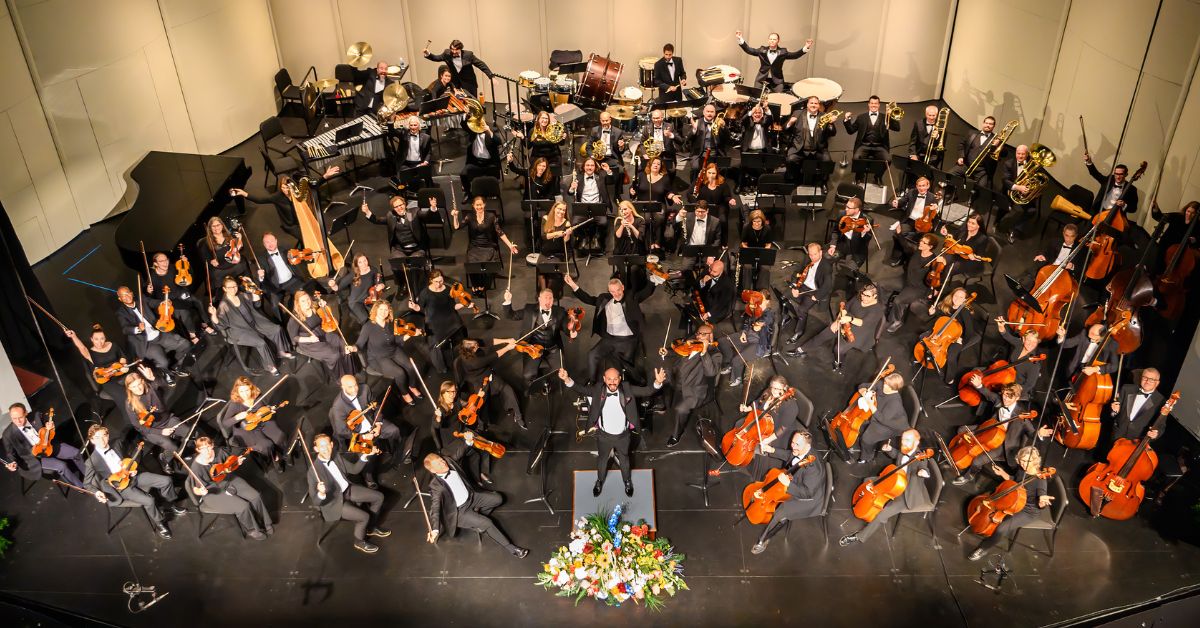 An overflowing stage played to a capacity audience in the P. E. Monroe Auditorium on the campus of Lenoir-Rhyne University in downtown Hickory, NC, as four choruses combined with the Western Piedmont Symphony, reinforced by many percussion instruments. Under the direction of Maestro Matthew Troy, the huge ensemble filled the hall with rhythms, mostly pulsing and pounding, but occasionally swooning and soothing as they portrayed the passions, frustrations and futility of life and love in the 12th century, described by these ancient poetical manuscripts conserved in a monastery and known as the “Songs of Benedictine Buria.” For this performance, an English translation was projected on a pair of video screens flanking the orchestra.
An overflowing stage played to a capacity audience in the P. E. Monroe Auditorium on the campus of Lenoir-Rhyne University in downtown Hickory, NC, as four choruses combined with the Western Piedmont Symphony, reinforced by many percussion instruments. Under the direction of Maestro Matthew Troy, the huge ensemble filled the hall with rhythms, mostly pulsing and pounding, but occasionally swooning and soothing as they portrayed the passions, frustrations and futility of life and love in the 12th century, described by these ancient poetical manuscripts conserved in a monastery and known as the “Songs of Benedictine Buria.” For this performance, an English translation was projected on a pair of video screens flanking the orchestra.
The Bavarian composer, Carl Orff (1895-1992) was introduced to these texts in the 1930’s and set 24 of these bawdy poems to music, maintaining the original languages (Latin, low German, old French, etc.). While the literal texts must be translated to be understood, the choice of instruments, rhythms and chorus do much to convey the implications of the texts. As a composer, Orff was opposed to the use of counterpoint, familiar to most music-lovers as the “style of Bach.”
Three outstanding vocal soloists sang various of the 24 songs, but the largest share of the work fell to the excellent combined choruses (Catawba Valley Community College Choir, Hickory Chorale Society, Lenoir-Rhyne A Cappella Choir and the Lenoir-Rhyne Youth Chorus). Although much of the work is familiar to audiences, the opening (and repeated at the end) chorus (“O Fortuna”) is so popularly used in films and advertising that there was a sigh of immediate recognition by the audience!
Baritone Michael Adams is a fine singer with a warm rich sound and the promise of power when needed. The close proximity of a microphone seemed to exaggerate some vowels in certain ranges, but careful attention by the technicians evened things out before they got bothersome. It is unfortunate that a hall so large would have such a comparatively small stage requiring amplification!
Soprano Sequina Dubose has a refined voice with great expression covering the entire range of gorgeous high notes, and the best intonation I have ever heard live in the passionate and moving “Dolcissime” (“Sweetest boy,” a moment of submission hovering between high “B” and “D” above the staff)!
One of the other thrilling solos is the solitary aria given to the tenor, who must impersonate a roasted swan, on a spit, burnt black and now confronting a face full of teeth. Daniel Stein was fantastic in this role which is sung (mostly) in the highest tenor range. Strutting on stage during a bassoon solo which could not sound more like the butchering of a swan (extraordinary bassoon-playing by Paige West-Smith), Stern sang his solo without score or music stand and left the stage immediately after, a cameo appearance, a real “swan song!”
The polished and refined singing that the young ladies of L-R Youth Chorus sung are usually sung by a boys’ chorus, with a bit of prankish expression and boyish teasing. However, the text (mercifully in Latin) often raises more ruckus than right notes when sung by males!
It is a pleasure to follow Maestro Troy as he plunges into the heart of a career for which he seems eminently prepared – from viola to conducting to several years leading the Piedmont Wind Symphony and finally an orchestra of high quality which he is building and shaping into an instrument of excellence. Bravo, Maestro!
The concert opened with the Academic Festival Overture by Johannes Brahms; a clever interweaving of campus songs popular in the late 19th Century. The orchestra sounded good in the brisk tempo that Maestro Troy chose, and ended with the familiar “Gaudeamus Igitur,” [“Let us rejoice while we are young!”]
The popularity of Carmina Burana is great enough to have sold out a hall even as large as the Monroe Auditorium on a rainy night – but there are tickets still available for tonight’s Friday, February 10 repeat performance at the Schaefer Center in Boone, NC on the campus of Appalachian State University. This will feature the Appalachian State University Chorus and The Appalachian Chorale. Don’t miss this lively performance!











